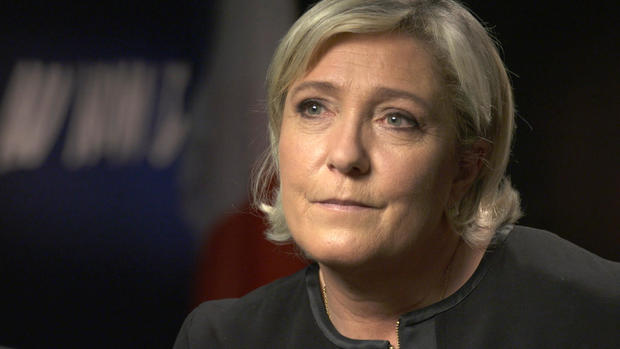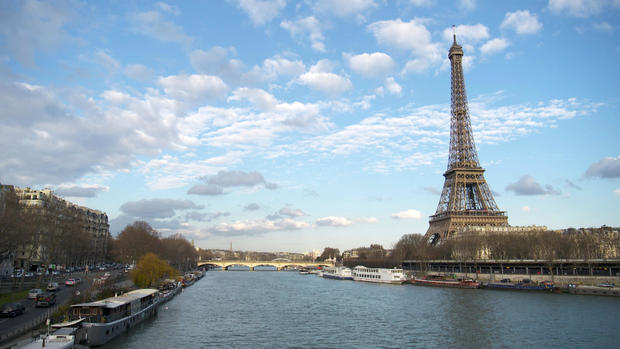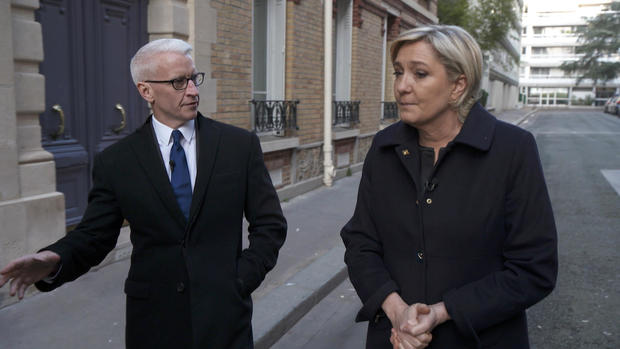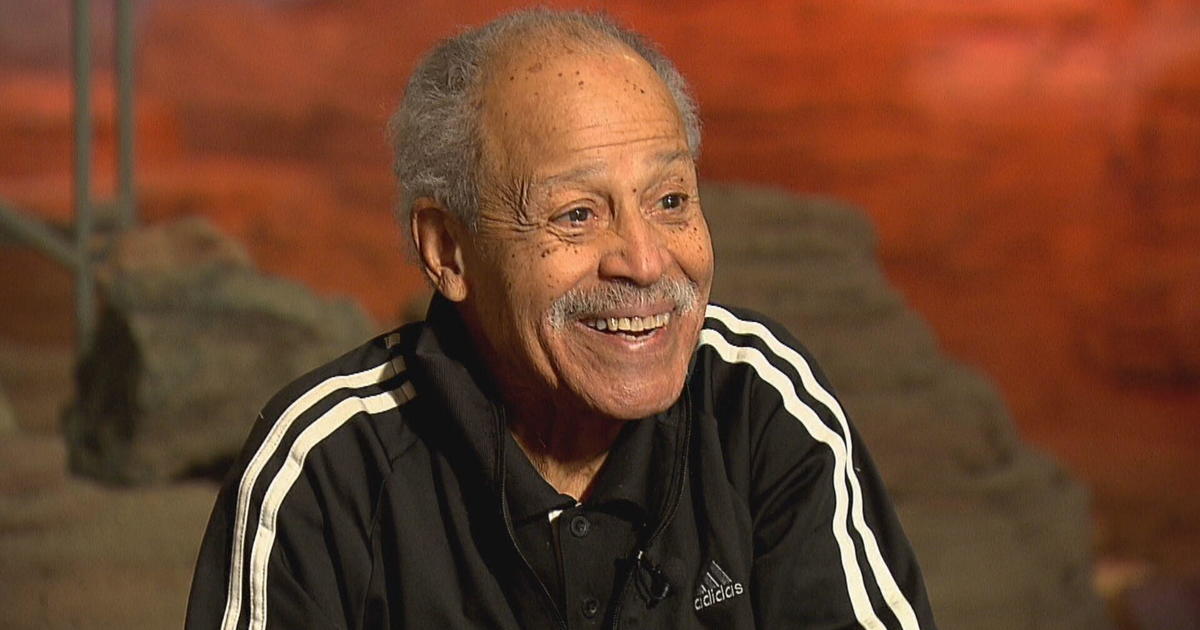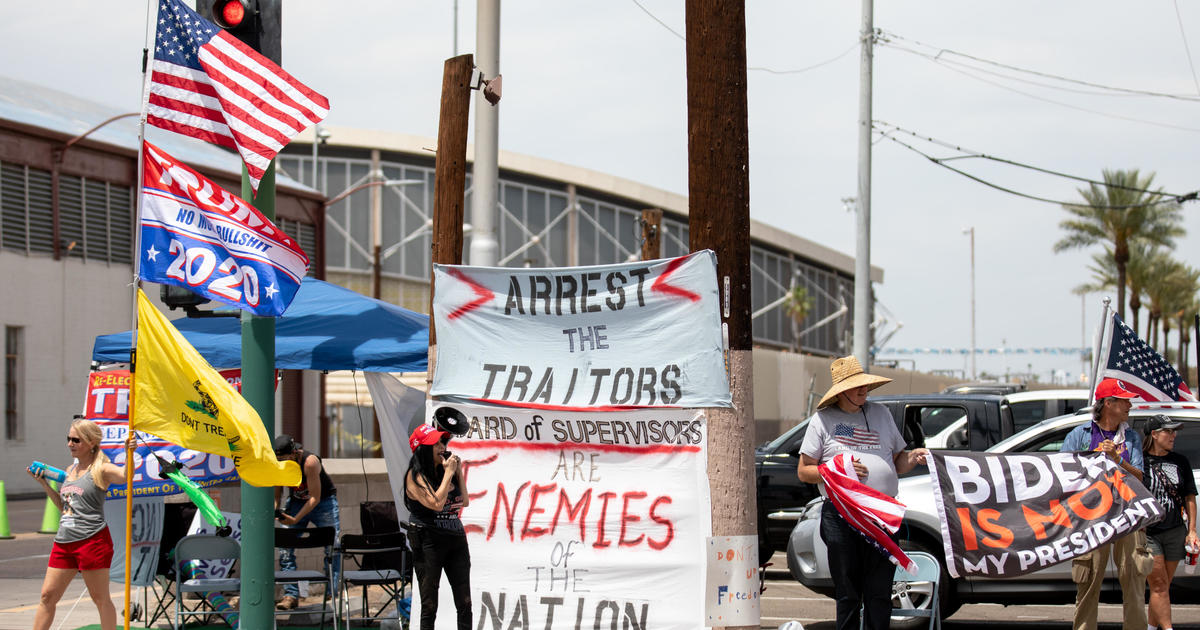France's Marine Le Pen says she’s not waging a religious war
The following is a script from “Le Pen,” which aired on March 5, 2017. Anderson Cooper is the correspondent. Michael H. Gavshon, Francois Bringer and David M. Levine, producers.
We begin tonight with a story about a populist politician who rails against free trade, wants to get tougher on immigration, is skeptical of NATO and sympathetic to Russia. We’re talking about a woman named Marine Le Pen, the candidate in France’s upcoming presidential election who’s shocked the political establishment with her meteoric rise, shocked because the name Le Pen has long been associated with anti-Semitism and racism in Europe.
Her party, the National Front, used to be on the fringes of French politics, but in recent years Marine Le Pen has given it a makeover and she’s now riding a wave of populist anger sweeping the West with Britain’s vote to leave the European Union and the election of President Trump. And just like Mr. Trump’s rise, the rise of Marine Le Pen is turning conventional political wisdom on its head.
Anderson Cooper: The polls say you can’t win.
Marine Le Pen (translation): Yes. They also said that Brexit wasn’t going to happen, that Donald Trump wasn’t going to be elected, wasn’t even going to be his party’s nominee. Well, they’re saying that less and less now. They are much more cautious, much more cautious now.
“France isn’t burkinis on the beach. France is Brigitte Bardot. That’s France.”
The nationalist policies Marine Le Pen embraces are gaining supporters throughout France and around the world. She’s hostile to free trade, rejects open borders and says globalization, promoted for decades by France’s political elites, is destroying her country.
Anderson Cooper: So how do you explain what is happening. Did leaders go too far?
Marine Le Pen (translation): Yes. Yes. Of course they’ve gone too far. Globalization has become an ideology with no constraints. And now, nations are forcing themselves back into the debate. Nations with borders we control, with people that we listen to, with real economies, not Wall Street economies, but rather factories and farmers. And this goes against this unregulated globalization, wild, savage globalization.
Anderson Cooper: Savage globalization?
Marine Le Pen (translation): Yes, Savage of course. Wild globalization has benefited some, but it’s been a catastrophe for most.
A catastrophe, she says, which has ravaged the French economy, as jobs have faded away and immigrants have flooded in, many of them Muslim immigrants, from North Africa who Le Pen says are draining resources, rejecting French values and transforming the culture.
Anderson Cooper: One of the concerns of many of your supporters is that immigration, current immigration is changing the character of France. It’s changing the spirit of the country?
Marine Le Pen (translation): It’s because of this massive immigration and more in some places, (that) France’s image has undeniably changed. There are a number of neighborhoods where you are no longer living a French life. That’s undeniable.
France is still a country of bistros and fine Bordeaux, baguettes and bucolic churches. But immigrants now make up 12 percent of the population and they’ve brought with them new beliefs and customs, couscous and kebabs, head scarves and an outfit called the Burkini, a full-body swimsuit for Muslim women that’s become the latest flashpoint in a raging culture war. We were surprised at just how far Marine Le Pen was willing to go to enforce assimilation.
Marine Le Pen (translation): France isn’t burkinis on the beach. France is Brigitte Bardot. That’s France.
Anderson Cooper: Should Muslim people be allowed to wear headscarves?
Marine Le Pen (translation): No. I’m opposed to wearing headscarves in public places. That’s not France. There’s something I just don’t understand: the people who come to France, why would they want to change France, to live in France the same way they lived back home?
It’s not just headscarves. Le Pen says she would ban yarmulkes in public, any conspicuous symbol of religious belief.
“There’s something I just don’t understand: the people who come to France, why would they want to change France, to live in France the same way they lived back home?”
Anderson Cooper: Would a Sikh person allowed to be (SIC) wear a turban?
Marine Le Pen (translation): No, not in public. We don’t have a lot of Sikhs in France. We’ve got some. But we don’t really hear much from them or about them. Which is good news.
Her views go to the heart of a debate that’s been raging in the country for decades, over what it means to be French and who’s responsible for the failure of some immigrants to become fully integrated into French society.
Marine Le Pen (translation): Massive immigration brings with it cultures that are sometimes in contradiction with our values.
Anderson Cooper: There are many people in France who view your party as anti-Islamic, anti-Muslim?
Marine Le Pen (translation): I’m not waging a religious war. It’s clear that in France, everyone has the right to practice their religion, to worship as they choose. My war is against Islamic fundamentalism.
Le Pen blames fundamentalism but also immigration for the terror attacks in France that have killed more than 200 people in the last two years, though half of the attackers were actually born in the country. She wants to shut down the mosques that she says encourage fundamentalism, tighten borders, drastically reduce legal immigration and expel all illegal immigrants.
“I’m not waging a religious war. It’s clear that in France, everyone has the right to practice their religion, to worship as they choose. My war is against Islamic fundamentalism.”
Anderson Cooper: You’re talking about deporting them?
Marine Le Pen (translation): Expulsion. It’s the law, its French law.
Anderson Cooper: There’s a lot of fear among some immigrants about
the idea of you becoming president.
Marine Le Pen (translation): I think a lot of people are trying to scare them. But in reality, they have nothing to fear. You know, people who behave need not worry. Foreigners in France who hold a job, who respect our laws, our codes, have absolutely nothing to worry about.
Many people are worried though because the Le Pen name carries a lot of baggage in France. Her father, Jean-Marie Le Pen is a political pugilist and provocateur who co-founded the National Front in the early 70s, the party became a haven for racists and anti-Semites. Jean Marie Le Pen famously dismissed the Nazi gas chambers as a mere “detail” of history and courts have repeatedly found him guilty of questioning the Holocaust.
He is a despised figure. One night, when Marine was 8, a massive bomb was detonated just outside the family apartment. Incredibly, no one was killed. She took us back to her old neighborhood and the site of the attack.
Marine Le Pen (translation): The building was torn apart… the back of the building was completely destroyed.
Anderson Cooper: Were you inside at the time?
Marine Le Pen (translation): Yes. Yes, we were sleeping and the bomb went off at 4 o’clock in the morning. It’s really strange. I have not been back for 40 years. Never.
Her father’s bigotry cast a long shadow. At school, Le Pen says teachers who resented his politics took it out on her. She had to develop a thick skin at an early age.
Marine Le Pen (translation): It was my first entry into politics.
Anderson Cooper: You’re prepared for anything.
Marine Le Pen (translation): I think so, yes.
Jean-Marie Le Pen ran for president five times, but was never able to be anything more than an opposition figure. When Marine took over his National Front party in 2011, she began rebranding it; banishing party members who made anti-Semitic remarks. It was a process that came to be known as the “De-demonization” of the National Front. Two years ago, in a move worthy of Shakespeare, she kicked her own father out of the party he founded.
Anderson Cooper: Do you have any contact with him?
Marine Le Pen (translation): No, no -- No, I don’t have any contact with him now. We broke up. Broke up politically. It was a very clear decision on my part to have a political break. Which he turned into a family breakup, a personal break-up. And that was his choice.
Le Pen is now a practiced politician. As a member of the European Parliament, she spent years polishing her persona as a straight-talking, working mom and French everywoman, doing her best to make people forget her party’s past.
Anderson Cooper: It’s interesting. When you go to a Marine Le Pen rally, or you look at her posters, you don’t see her last name. You don’t even see the-- really the name of the party very much.
Nonna Mayer: But she is right. If she wants to succeed, she must cut all links with that past. She is the daughter of Jean-Marie Le Pen. And for her, that’s an obstacle.
Nonna Mayer is a professor in Paris and considered a leading authority on the National Front.
Anderson Cooper: She’s tainted because of her last name.
Nona Mayer: Yes. She is a Le Pen. That w-- helped her--
Anderson Cooper: And in France, that name is still toxic.
Nona Mayer: Yes.
But Mayer says that while her father and his anti-Semitic rhetoric may be gone, the nationalist ideology of the National Front hasn’t really changed.
Nona Mayer: There have been cosmetic changes.
Anderson Cooper: Cosmetic changes.
Nona Mayer: But for the rest, at the heart of the party, the very base of its message is the idea that you’re going to keep the jobs, social benefits-- the-- everything. Employment. All will be reserved to the French, French citizens.
Anderson Cooper: French citizens instead of immigrants to the country will have priority over access to jobs, housing, welfare.
Nona Mayer: Everything. You have two kinds of people living in France, the French, and the others.
That view of French society, us versus them, is gaining new converts among people who never would have considered voting for the National Front before…
“We’ve tried other candidates,” Emmanuel Rignaux says. “There’s only one person we haven’t tried, and that’s Marine. So we say: let’s give her a shot.”
In a country with 10 percent unemployment, twice what it is in the U.S., Le Pen has built a stronghold in the Northern rustbelt, where factories have closed and jobs have disappeared.
While she may be a candidate of the far right, some of her policies come straight out of the playbook of the French left. She promises more government benefits and greater worker protections.
Anderson Cooper: When Donald Trump says, “Make America great again,” are you saying, “Make France great again?”
Marine Le Pen (translation): Yes, of course. I’ve been saying that for many years. We are a great nation, which has lot to offer to the world, but to offer something to the world France has to remain France.
She calls for a radical shift in the country’s foreign policy, vowing to renegotiate its membership in the European Union, or else leave altogether. A move that could result in the breakup of the EU. And just like President Trump, she’s questioned the role of NATO, and advocates closer ties with Russia.
Anderson Cooper: What is your admiration for Russia, for Vladimir Putin?
Marine Le Pen (translation): Look. I’m not a fan in a rock concert, you see. I am a political leader in a great nation of the world. What interests me are France’s interests.
Anderson Cooper: You don’t believe Russia’s a threat for Europe?
Marine Le Pen (translation): I don’t believe that at all. I think that’s a big scam.
Anderson Cooper: Invasion in Ukraine--
Anderson Cooper: Invasion of Crimea?
Marine Le Pen (translation): I’ll tell you what the danger is for Europe. It’s carrying out a cold war against Russia and pushing Russia into China’s arms. That’s the threat to Europe.
Anderson Cooper: You don’t think Vladimir Putin, though, is a killer, is a-- is a-- a threat to France, to others in this region?
Marine Le Pen (translation): No, I don’t believe it is so. Nothing Vladimir Putin has done would make me reach that conclusion.
Her views on Russia and Vladimir Putin have drawn scrutiny, particularly because three years ago, a Russian bank loaned her more than $11 million to fund her party.
Anderson Cooper: Your critics will say that that influences you in your opinion of Russia.
Marine Le Pen (translation): Why would it influence me? When you take out a loan, what’s your obligation other than paying it back? You have no other obligation. But if you know an American bank that wants to lend me money, by all means because I’m still looking for funds. Particularly since French banks, for political reasons, have refused to give us a loan to allow us to campaign.
That Russian loan and a widening probe into her party’s finances have not quieted the frenzy that now follows Marine Le Pen everywhere. With less than two months to go before the first votes are cast, she and her party are closer to power than ever.
Marine Le Pen: Vive les peuples, Vive la Republique! Vive la France!
Credit: Patrick Zachmann-Magnum Photos
